#SAP shipping software
Explore tagged Tumblr posts
Text
An integrated multi-carrier shipping software provides significant benefits for SAP users, streamlining their shipping processes and enhancing operational efficiency. By seamlessly integrating with SAP, the software enables a seamless and automated shipping workflow, simplifying the entire shipping process from order creation to label generation and tracking. Here are the benefits and how the integration works
#SAP shipping software#multi carrier shipping software#shipping software#shipping solutions#logistics software#cloud shipping#Integrated SAP shipping software
1 note
·
View note
Text
2024 team sponsors recap!
this is completely irrelevant to F1 but i study and do these stuffs for a living sooo 😩😩 2023 sponsors are based on the sponsors that are there at the beginning of the season (new sponsors that join in the middle of the season will be classified as 2024's)
Mercedes AMG Petronas F1 Team:
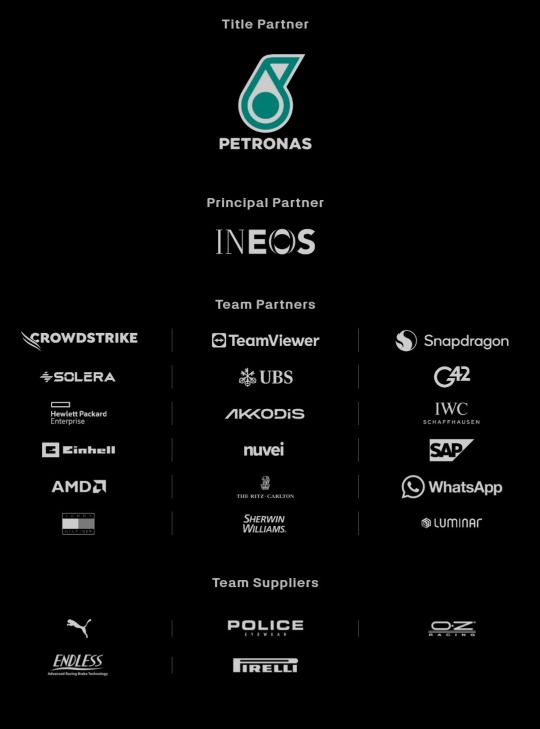
New sponsors: Whatsapp, Luminar (American tech company), SAP (German software company), nuvei (Canadian credit card services), Sherwin Williams (American painting company) 2024 data last update: 2024/02/14
Old sponsors that left: Monster Energy, Pure Storage (American technology company), fastly (American cloud computing services), Axalta (American painting company), Eight sleep (American mattresses company) 2023 data last update: 2023/01/07
Oracle Red Bull Racing F1 Team:
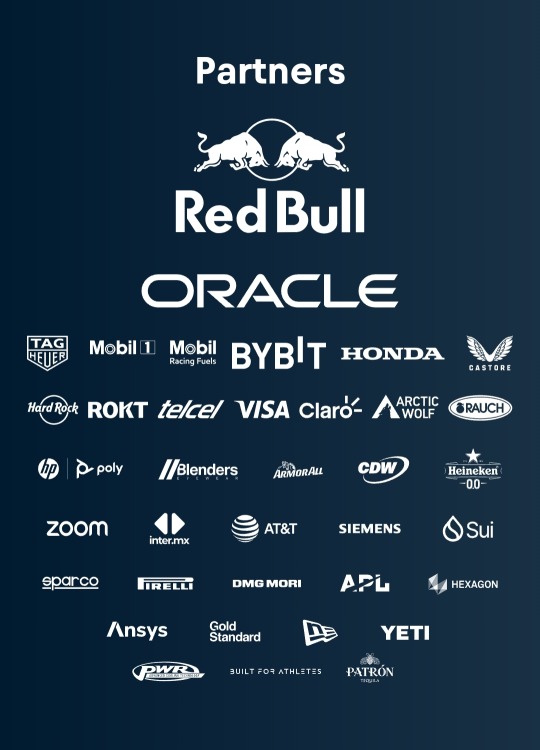
New sponsors: Yeti (American cooler manufacturer, joined later in 2023), APL (American footwear/athletic apparel manufacturer, joined later in 2023), CDW (American IT company, joined later in 2023), Sui (American tech app by Mysten Labs, joined later in 2023), Patron Tequila (Mexican alcoholic beverages company, joined later in 2023) 2024 data last update: 2024/02/15
Old sponsors that left: CashApp, Walmart, Therabody (American wellness technology company), Ocean Bottle (Norwegian reusable bottle manufacturer), PokerStars (Costa Rican gambling site), Alpha Tauri (? no info if they're official partners or not but Austrian clothing company made by Red Bull), BMC (Switzerland bicycle/cycling manufacturer), Esso (American fuel company, subsidiary of ExxonMobil), Hewlett Packard Enterprise (American technology company) 2023 data last update: 2023/03/07
More: Esso is a subsidiary of Mobil so there's possibility they merged or something
Scuderia Ferrari:
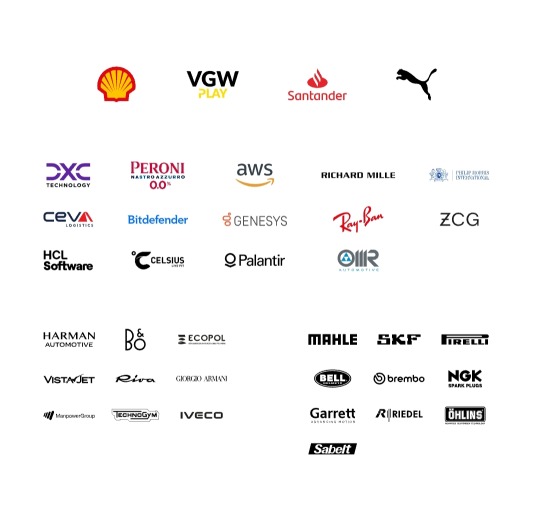
New sponsors: VGW Play (Australian tech game company, joined later in 2023), DXC Technology (American IT company, joined later in 2023), Peroni (Italian brewing company), Z Capital Group/ZCG (American private asset management/merchant bank company), Celsius (Swedish energy drink manufacturer) 2024 data last update: 2024/02/15
Old sponsors that left: Mission Winnow (American content lab by Phillip Morris International aka Marlboro), Estrella Garcia (Spanish alcoholic beverages manufacturer), Frecciarossa (Italian high speed train company) 2023 data last update: 2023/02/16
More: Mission Winnow is a part of Phillip Morris International. They are no longer listed as team sponsor but PMI is listed instead.
(starting here, 2023 data last update is 2023/02/23 and 2024 data last update is 2024/02/15)
McLaren F1 Team: (Only McLaren RACING's data is available idk if some of these are XE/FE team partners but anw..)
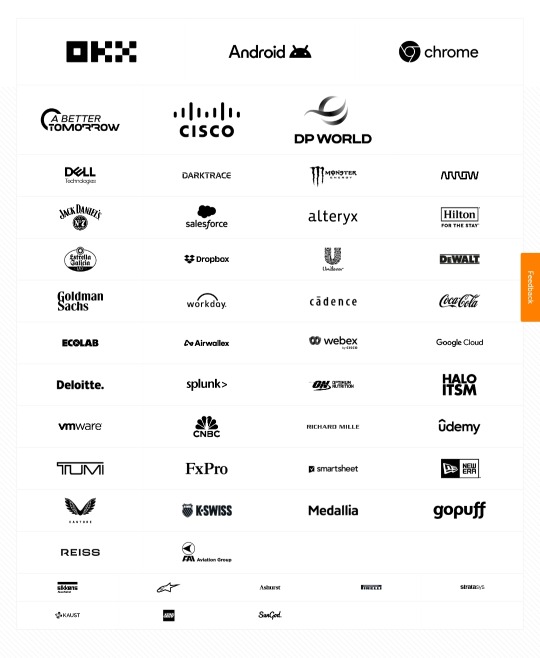
New sponsors: Monster Energy, Salesforce (American cloud based software company, joined later in 2023), Estrella Garcia (Spanish alcoholic beverages manufacturer), Dropbox (American file hosting company), Workday (American system software company, joined later in 2023), Ecolab (American water purification/hygiene company), Airwallex (Australian financial tech company), Optimum Nutrition (American nutritional supplement manufacturer), Halo ITSM (American software company, joined later in 2023), Udemy (American educational tech company, joined later in 2023), New Era (American cap manufacturer, joined in 2023), K-Swiss (American shoes manufacturer, joined later in 2023), Alpinestars (Italian motorsports safety equipment manufacturer)
Old sponsors that left: DP World (Emirati logistics company), EasyPost (American shipping API company), Immersive Labs (UK cybersecurity training company?), Logitech, Mind (UK mental health charity), PartyCasino (UK? online casino site), PartyPoker (American? gambling site), Sparco (Italian auto part & accessory manufacturer), Tezos (Switzerland crypto company)
Aston Martin Aramco F1 Team:

New sponsors: Valvoline (American retail automotives service company, joined later in 2023), NexGen (Canadian sustainable? fuel company), Banco Master (Brazilian digital banking platform, joined later in 2023), ServiceNow (American software company, joined later in 2023), Regent Seven Seas Cruise, Wolfgang Puck (Austrian-American chef and restaurant owner, joined later in 2023), Financial Times (British business newspaper), OMP (Italian racing safety equipment manufacturer), stichd (Netherlands fashion & apparel manufacturer)
Old sponsors that left: Alpinestars (Italian motorsports safety equipment manufacturer), crypto.com (Singaporean cryptocurrency company), ebb3 (UK? software company), Pelmark (UK fashion and apparel manufacturer), Peroni (Italian brewing company), Porto Seguro (Brazilian insurance company), Socios (Malta's blockchain-based platform), XP (Brazilian investment company)
Stake F1 Team (prev. Alfa Romeo):
???? Can't found their website (might be geoblocked in my country???)
BWT Alpine F1 Team:
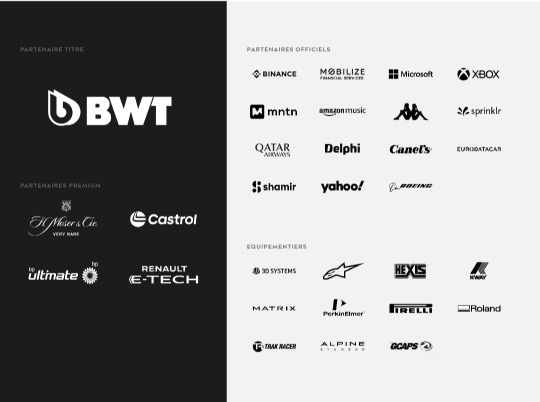
New sponsors: MNTN (American software company), H. Moser & Cie (Switzerland watch manufacturer), Amazon Music
Old sponsors that left: Bell & Ross (French watch company), Ecowatt (??? afaik French less-energy smthn smthn company), Elysium (French? American? Software company), KX (UK software company), Plug (American electrical equipment manufacturing company)
Visa CashApp RB F1 Team (prev. Scuderia Alpha Tauri):

New Sponsors: Visa, CashApp, Hugo Boss, Tudor, Neft Vodka (Austrian alcoholic beverages company), Piquadro (Italian luxury bag manufacturer)
Old sponsors that left: Buzz (?), Carl Friedrik (UK travel goods manufacturer), Flex Box (Hongkong? shipping containers manufacturer), GMG (Emirati global wellbeing company), RapidAPI (American API company)
Haas F1 Team:

New sponsors: New Era (American cap manufacturer, joined later in 2023)
Old sponsors that left: Hantec Markets (Hongkong capital markets company), OpenSea (American NFT/Crypto company)
Williams Racing:


New sponsors: Komatsu, MyProtein (British bodybuilding supplement), Kraken (American crypto company, joined later in 2023), VAST Data (American tech company), Ingenuity Commerce (UK e-commerce platform), Puma (joined later in 2023)
Old sponsors that left: Acronis (Swiss software company), Bremont (British watch manufacturer), Dtex Systems (American? cybersecurity company), Financial Times (British business newspaper), Jumeirah Hotels & Resorts, KX (UK software company), OMP (Italian racing safety equipment manufacturer), PPG (American painting manufacturer), Umbro (English sports equipment manufacturer), Zeiss (German opticals/optometrics manufacturing company)
#mercedes amg petronas#red bull racing#scuderia ferrari#visa cash app rb#haas f1 team#mclaren f1#aston martin#alpine f1#williams racing#stake f1 team#f1#ari's rant#sponsor talks
42 notes
·
View notes
Text
Enhancing Manufacturing Excellence: 6 Key Benefits of SAP Business One
Staying ahead of the competition requires more than just producing high-quality products. It demands efficient operations, streamlined supply chains, and real-time decision-making capabilities. This is where SAP Business One, a robust Enterprise Resource Planning (ERP) solution, steps in to transform the manufacturing sector. In this blog, we will explore six significant benefits that SAP Business One brings to manufacturers of all sizes, from small businesses to mid-sized enterprises.

Better Visibility
One of the primary challenges in manufacturing is maintaining visibility into the complex web of supply chains, operations, and inventory resources. SAP manufacturing software addresses this challenge by providing enhanced visibility through seamless integration with shipping logistics and supply chains. This integration empowers manufacturers with real-time data, enabling them to make well-informed decisions promptly.
Furthermore, the platform offers customized and interactive dashboards that offer a 360-degree view of the entire manufacturing process. This flexibility in analysis and insights allows manufacturers to adapt swiftly to changing customer demands and meet stringent deadlines.
Improved Productivity
SAP manufacturing software incorporates Material Requirements Planning (MRP) functionality, which replaces outdated production scheduling methods with a structured, multilevel production process. MRP also facilitates resource planning for machine maintenance, leading to overall productivity improvements.
Additionally, the MRP wizard streamlines material procurement and production planning, significantly reducing pre-production lead times. This efficiency boost directly contributes to enhanced productivity and better resource utilization.
Cost Control
Cost control is a paramount concern for manufacturing companies. SAP manufacturing software offers a solution by optimizing daily operations, reducing waste, and simplifying processes. Informed decision-making, enabled by SAP manufacturing software, aids in identifying cost-saving opportunities and increasing overall business profitability.
Working Capital Management
Managing working capital is essential for the day-to-day operations of manufacturing companies. SAP manufacturing software offers a comprehensive suite of modules and capabilities that help in managing working capital effectively. This includes overseeing accounts receivables, accounts payables, cash flow, liquidity, and inventory planning.
Customized purchasing reports provide real-time insights into working capital challenges, replacing the traditional year-end or month-end reports. This level of control from SAP services allows manufacturers to make proactive decisions, ensuring the stability of their operations.
Inventory Management
Effective inventory management is critical for manufacturing success. SAP Business One equips manufacturers with advanced warehouse tracking features and real-time stock reports. These features help document stock levels and monitor stock transfers between warehouses, ensuring a lean inventory management approach.
The ERP solution strikes an ideal balance between inventory stock and production capacities, facilitating on-time product deliveries, efficient inventory cost management, and meeting customer demands effectively.
Regulatory Compliance
Manufacturers must adhere to industry regulations at every stage of the manufacturing process, from procurement to final product delivery. SAP Business One plays a crucial role in improving regulatory compliance by integrating these standards into its operations seamlessly.
Furthermore, the platform empowers manufacturers to embed quality control into their manufacturing processes, providing insights into vendor performance and enhancing customer satisfaction.
Conclusion
SAP system emerges as a powerful ally, offering a wide array of benefits to manufacturers. From improved visibility and productivity to cost control, working capital management, inventory optimization, and regulatory compliance, this ERP solution empowers manufacturing companies to thrive in a competitive environment. By embracing SAP Business One, manufacturers can embark on a journey toward excellence, ensuring they meet customer demands efficiently and maintain a strong position in the market.
2 notes
·
View notes
Text
The Benefit of Using a Procurement Company With Logistics and Products Transportation Capabilities

Purchase is the procedure of determining as well as obtaining goods and services. It includes sourcing, acquiring as well as covers all tasks from determining prospective suppliers through to shipment from distributor to the individuals or beneficiary. Procurement is a key activity in the supply chain administration.
Logistics staff involvement in assessments offers logistics info as well as data that supports program/response application. All significant business source preparation (ERP) software application vendors like Oracle and also SAP give products around logistics and also transport monitoring. Arrangement and implementation of these products needs in-depth understanding of the market, neighborhood and also global freight plans, and also fundamental understanding of the business technique. The general price of logistics plays a vital part in product pricing. The organization is after that able to prepare ahead for the provision of the goods as well as solutions. Hence, logistics is the cornerstone of firms which create physical items. Logistics also plays a vital duty in military operations. Logistics shortages can create severe problems to the firm's bottom line.
Several business have been proclaimed to shed their market placement owing to rivals having far better logistics monitoring. Ecommerce vendors like Amazon and also ebay.com depend on state of art logistics to keep ahead of the market. Success of firms is not just a variable of how well they do their core-business (like generate a certain product) but additionally exactly how well they contract out non-core parts of their organization to 3rd parties. shipping logistics near me
Provided the intricacy of logistics as well as transport, this is a vital location for outsourcing. Experienced business understand to collaborate with one-stop stores to define vital solution degree contracts around supply chain and after that leave it to the professionals to overcome the complexity as a black box. This permits the firm to focus on where it matters, their core service. Logistics firms give myriad advantages (over attempting an in-house version):.
Logistics automation. Procurement solutions. International network. Shipping as well as freight services. Market experience as well as Quantity price cuts.
Logistics Automation deals with minimizing labor expenses by integrating wise machinery, progressed software program and dynamic tools and modern technologies. As included advantages, automation additionally reduces power as well as material wastefulness, enhances high quality and precision. By using warehousing innovations like RFID, automated placement and also storage, software program based supply tracking, companies give satisfaction with considerable expense advantage (that features co-location of your items).
Purchase services can vary from consultatory on resources purchase to rate monitoring. Companies with both straight (basic material) purchase and indirect procurement (fixing and also upkeep materials). They help come to a sweet area between amount and frequency while offering sector particular value. It is prevalent expertise that apparently inconsonant sectors make use of comparable product and also equipment. For instance, a manufacturing plant calls for safety and security and also clinical supplies, whereas, a health center needs general upkeep products. Utilizing one stop stores enable one to benefit from the large range of materials in their purview.
Shakespeare's 'all the globe is a stage' quite possibly obtains the current business versions with open market acts in between countries being widespread. The capability to supply to remote countries, while not needing to manage disambiguation of policy, money as well as language subtleties is vital to worldwide success. One stop stores have all the global network and also connections to encourage and perform your international shipping undertakings.
The aim of transport is to physically move products in a reputable and also safe way, promptly, price properly and also effectively to its location. Even if a company owns its cars, there may well be events when a demand develops for additional ability, to satisfy peak task or various other short term requirements. This can be fulfilled by the use lorries supplied by an industrial transport company (third party). Additionally using the 3rd party delivery as well as freight solution is advantageous to the company because:.
of the variable lots and also trips can be provided for. the hauler may have the ability to supply a much more affordable as well as an extra reliable solution. the obligation for administration of cars and drivers is no longer the duty of the company (hence enabling staff to focus on much more productive areas). transport logistics near me there is no need for resources to be purchased transportation. Several on-line logistics firms give consulting solutions whereby the customers can conquer their challenges that they face while trading goods. Market professionals well versed with plans and also laws, audit (like SAS70) as well as compliance requirements (for example hazardous and also ignitable materials), dynamic factors (like weather condition, socio-political events) and vendor staminas (like volume discounts and geographical insurance coverage) are gotten in touch with as well as business companies can create their own time and also cost effective logistical time table while optimizing their spending plan at the same time.
3 notes
·
View notes
Text
Understanding the Technology Behind Barcode Security Tags

Introduction: AIDC India’s Innovation in Barcode Security Tags for 2025
Asset protection is a growing priority for businesses in India, especially with the increasing volume of inventory, equipment, and data-driven operations. In 2025, Barcode Security Tags are emerging as a dependable solution for managing and safeguarding assets. AIDC Technologies India is leading this movement by offering advanced barcode tagging solutions tailored for modern industries.
Through years of experience in automation and identification, AIDC has developed scalable barcode security systems that help organizations monitor assets in real-time, prevent loss, and simplify audits—all while reducing operational errors.
What Is Barcode Security Tag Technology? AIDC’s 2025 Overview
Barcode Security Tags are labels embedded with unique barcode patterns that are assigned to physical items for identification and tracking. These tags are scanned using barcode readers to instantly access asset data, such as item details, location, and maintenance history.
AIDC Technologies India designs these barcode tags to be secure, tamper-resistant, and compatible with various scanning systems. By integrating barcode labels into inventory and asset management processes, businesses gain better control over their resources and reduce dependency on manual tracking methods.
How AIDC’s Barcode Security Tags Work to Protect Assets
The working mechanism behind AIDC’s Barcode Security Tags is straightforward but highly effective. Each asset is tagged with a barcode that links to a centralized database. When scanned, the system immediately displays the item’s status, location, or usage history. This helps businesses:
Track asset movement across departments or sites
Detect unauthorized transfers or missing items
Schedule preventive maintenance
Ensure accurate inventory counts
AIDC uses durable materials that withstand wear, moisture, and environmental stress, making their tags suitable for both indoor and outdoor use. Whether it’s IT equipment in offices or tools in warehouses, AIDC’s barcode tags help organizations maintain complete visibility.
Features of AIDC’s 2025 Barcode Security Tag Solutions
AIDC’s Barcode Security Tags stand out because of their unique features tailored to real-world business needs:
Tamper-Proof Design: Prevents unauthorized removal or reuse
High Scan Accuracy: Clean printing and coding ensure error-free data capture
Durable Materials: Resistant to heat, dust, and physical damage
Customizable Formats: Support various sizes, designs, and 1D/2D barcode types
Color Coding Options: Helps quickly distinguish between categories or departments
These features ensure long-term reliability and make AIDC’s barcode tags ideal for businesses with large-scale or sensitive assets.
AIDC’s Barcode Tag Integration with RFID, ERP, and POS Systems
One of the strongest advantages of working with AIDC is their ability to integrate barcode security tags with existing technologies. AIDC’s systems work seamlessly with:
RFID platforms for hybrid tracking solutions
ERP software like SAP, Oracle, or Zoho for asset synchronization
POS systems to link inventory sales and movement data
This integration allows businesses to automate asset updates, generate reports, and reduce manual entries. With AIDC, you don’t need to replace your existing systems—just enhance them with smarter tagging solutions.
Industries That Rely on AIDC’s Barcode Security Tags
AIDC’s Barcode Security Tags are trusted by organizations across multiple industries:
Retail: For tagging products, managing stockrooms, and preventing theft
Healthcare: For tracking medical tools, patient files, and equipment usage
Logistics: For monitoring cargo, shipping containers, and supply chains
Offices & IT: For managing laptops, servers, and sensitive electronic devices
Education & Libraries: For cataloging books, lab tools, and administrative assets
Each industry has unique tagging needs, and AIDC offers customized solutions to meet them. Their experts assess operational challenges and design tags that fit into daily workflows without disruption.
Benefits of AIDC Barcode Security Tags in Asset Management
Adopting AIDC’s Barcode Security Tags brings immediate and long-term advantages for any organization:
Enhanced Asset Visibility: Easily locate and track assets across multiple locations
Reduced Theft and Misplacement: Secure tagging helps prevent unauthorized access or removal
Streamlined Audits: Quick scanning and database syncs simplify compliance and reporting
Time and Cost Efficiency: Reduces time spent on manual checks and limits human error
Easy Implementation: Minimal setup and user training required
These benefits translate to better productivity, reduced losses, and smoother operations for businesses of all sizes.
AIDC’s Approach to Scalable and Customizable Barcode Tag Deployment
Not all businesses operate at the same scale, and AIDC understands that. Whether you need 50 tags or 50,000, AIDC delivers scalable solutions that grow with your organization. Their process includes:
Initial Consultation: Understanding asset types, volumes, and use cases
Design & Customization: Tailoring tag formats and barcode types
Deployment: Fast printing, delivery, and on-site setup if required
Training & Support: Guiding teams on how to use the system effectively
Ongoing Maintenance: Helping clients update or expand tagging as needed
AIDC’s hands-on approach ensures that clients receive not just products, but complete solutions.
Future Trends in Barcode Tagging: AIDC’s Vision for 2025 and Beyond
As businesses demand more automation and data intelligence, barcode tagging is evolving rapidly. AIDC is already exploring trends like:
Smart Labels: That combine barcodes with sensors or QR codes for advanced tracking
Cloud-Based Dashboards: To monitor asset movement from anywhere
AI-Powered Scanning Tools: That automatically analyze and interpret barcode data
Eco-Friendly Tags: Made with recyclable materials to support sustainability goals
By staying ahead of trends, AIDC ensures that their clients benefit from future-ready technology without overhauling their systems.
Why Choose AIDC India for Barcode Security Tag Technology
With over two decades of experience, AIDC Technologies India has become a trusted name in barcode and automation systems. Their Barcode Security Tags are more than just labels—they’re smart tools that empower businesses to operate more securely, efficiently, and confidently.
What sets AIDC apart is their commitment to customization, seamless integration, and long-term support. Their team works closely with clients to deliver tailor-made tagging systems that address specific business needs—whether it’s for a small retail outlet or a nationwide supply chain.
Ready to upgrade your asset security? Book a free consultation with AIDC Technologies India—your trusted partner in Barcode Security Tags and next-gen tracking systems.
#BarcodeSecurityTech#RetailSecurityInnovation#SecureBarcodes2025#BarcodeTaggingSolutions#InventoryProtectionTech#NextGenBarcodeSecurity#AIDCBarcodeSecurity
0 notes
Text

SAP SD Functional Consultant Training – Proexcellency Solutions, Top of Bangalore (2025)
SAP SD Online Training Top of Banglore 2025 In today’s competitive ERP task marketplace, becoming a licensed SAP SD Functional Consultant opens the door to a wide range of global profession opportunities. As groups increasingly undertake SAP for his or her business enterprise operations, there's excessive call for for skilled experts who can manipulate and optimize the Sales and Distribution processes inside the SAP panorama. For the ones searching for complete, palms-on training with real-world software and location help, Proexcellency Solutions, one of Bangalore’s pinnacle SAP training institutes in 2025, gives a standout SAP SD Functional Consultant Training Program.
Why Choose SAP SD as a Career Path?
SAP SD (Sales and Distribution) is one of the most critical modules in the SAP ERP gadget. It allows agencies control sales orders, purchaser relationships, pricing, shipping, billing, and integration with other commercial enterprise modules like MM (Materials Management) and FI (Finance).
Professionals educated in SAP SD are particularly valued across industries inclusive of production, retail, logistics, IT offerings, and prescribed drugs. A functional representative in SAP SD plays a key function in studying enterprise desires, configuring SAP systems, and making sure clean order-to-cash (O2C) methods.
Proexcellency Solutions – Leading the Way in SAP Training
Located in the heart of Bangalore, Proexcellency Solutions has established itself as a relied on and top-tier SAP schooling issuer. With a focal point on task-oriented getting to know and professional mentorship, their SAP SD Functional Consultant Training software is designed for sparkling graduates, running experts, and aspiring ERP experts.
Training Features & Curriculum Highlights
Structured Learning Path: The route begins with an introduction to SAP ERP, commercial enterprise manner information, and SD module fundamentals earlier than stepping into advanced configuration and integration topics.
End-to-End SAP SD Coverage:
Enterprise shape setup
Customer and material grasp records
Sales order processing
Pricing processes
Shipping and transport
Billing and invoicing
Credit management
SD integration with MM & FI modules
Real-Time Scenarios & Projects: Hands-on sports based totally on actual enterprise use cases to make certain newcomers are job-prepared from day one.
Expert Trainers: Learn from certified SAP SD consultants with widespread real-world implementation enjoy.
Live SAP Server Access: Practice on a actual SAP surroundings to reinforce theoretical standards via practical software.
SAP Certification Guidance: Full support and training for international SAP SD certification (e.G., C_TS462_2022), which adds considerable weight in your resume.
Placement-Oriented Training
Proexcellency Solutions provides a hundred% placement help to help students stable their first function as SAP SD consultants. Their profession aid includes:
Resume constructing aligned to SAP activity roles
Mock interviews with expert feedback
Direct process referrals and connections to hiring groups
Soft abilties and communication training
In 2025, with Bangalore continuing to thrive as India’s tech and ERP capital, Proexcellency’s region gives proximity to hundreds of SAP carrier companies, MNCs, and consulting corporations seeking out skilled expertise.
Conclusion
Proexcellency Solutions continues to lead as a pinnacle SAP SD Functional Consultant Training issuer in Bangalore in 2025, offering a effective aggregate of expert-led schooling, realistic experience, and dependable placement assist. With a tested song record and loads of a success alumni, Proexcellency is the proper choice for everyone extreme approximately constructing a future in SAP SD.
[email protected], +91-9148251978,+91-9008906809
0 notes
Text
Multi-Carrier Cloud Shipping Software Designed for all ERP Users
PIYOVI helps you digitally integrate to more than 100+ global carriers over 50+ countries and our primary focus is on empowering our customers to seamlessly integrate transportation processes into their existing IT landscape and warehouse infrastructure.
To know more about our shipping solution, visit our website and register for a personalized demo.

#shipping software#shipping solutions#logistics software#multi carrier shipping software#cloud shipping#shipping system#CloudTMS#shipping software solutions#SAP
1 note
·
View note
Text
Staff IT Software Engineer (SAP ABAP)
Job title: Staff IT Software Engineer (SAP ABAP) Company: Palo Alto Networks Job description: and development of PaloAlto’s next-generation Sales and Distribution, Material Management, Hardware Shipping, Subscription Billing… Specialist (preferred) Additional SAP certifications are a plus Soft Skills * Strong analytical and problem-solving abilities… Expected salary: Location: Bangalore,…
0 notes
Text
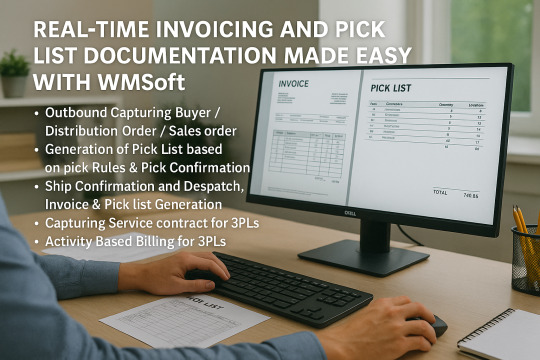
Real-Time Invoicing and Pick List Documentation Made Easy with WMSoft
In today's fast-paced logistics and supply chain environments, efficiency and accuracy are non-negotiable. Businesses need a reliable and scalable warehouse management software that streamlines outbound processes, ensures documentation precision, and supports complex 3PL operations. WMSoft by Infolog Solutions delivers exactly that.
This article explores how WMSoft simplifies outbound operations through real-time invoicing, automated pick list documentation, and powerful 3PL capabilities, helping businesses enhance accuracy, reduce delays, and improve customer satisfaction.
Outbound Operations: The Backbone of Warehouse Efficiency
Outbound logistics is one of the most critical functions in warehouse operations. Delays or errors in this stage can lead to customer dissatisfaction, return logistics, and revenue loss. WMSoft outbound warehouse operations brings structure and intelligence to this function through key features:
Capturing Buyer Orders, Distribution Orders, and Sales Orders
Generation of Pick Lists Based on Configurable Rules
Pick and Ship Confirmation
Real-Time Invoice and Pick List Generation
3PL Contract Capturing and Activity-Based Billing
Let’s explore each component in detail.
1. Capturing Buyer, Distribution, and Sales Orders
WMSoft begins the outbound journey by efficiently capturing orders from multiple sources. Whether it’s a buyer’s purchase order, a distribution order within a large supply chain management inbound and outbound network, or a direct sales order, WMSoft seamlessly ingests this data and aligns it with inventory availability and warehouse resources.
Key Features:
Integration with ERP/Order Management Systems: Orders can be auto synced from ERP systems like SAP, Oracle, or custom solutions.
Validation and Exception Handling: WMSoft checks for data completeness, item availability, and location-specific constraints before proceeding.
Batch Processing Support: Bulk orders can be processed and queued for pick list generation in real time.
2. Smart Pick List Generation Based on Pick Rules
One of the standout features of WMSoft is its rule-based pick list generation. Warehouses often use multiple pick strategies—FIFO (First-In-First-Out), FEFO (First Expiry-First Out), zone picking, or batch picking. WMSoft allows configuration of these rules based on warehouse requirements.
Benefits:
Customizable Pick Rules: Configure by SKU, location, expiry, customer priority, or transport mode.
Automated Task Assignment: Tasks are automatically assigned to pickers based on zone, shift, or skill level.
Reduction in Human Errors: Automating pick list creation significantly reduces manual errors and improves accuracy.
Pick lists can be generated in real time and shared digitally with handheld devices or printed for manual operations.
3. Pick Confirmation: Bringing Real-Time Accountability
Once pickers complete the task, WMSoft enables Pick Confirmation-a crucial checkpoint to ensure picked items match the order specification. The system supports barcode asset tracking software, RFID validation, and manual override options to confirm picks.
Highlights:
Real-Time Data Sync: Confirmations are instantly updated across systems.
Discrepancy Flags: Mismatches trigger alerts for immediate resolution.
4. Ship Confirmation and Despatch Automation
Following pick confirmation, WMSoft initiates Ship Confirmation, ensuring items are correctly packed, labelled, and ready for transportation. The system integrates with transport management systems and third-party logistics platforms for seamless despatch planning.
Key Functions:
Auto-Generate Shipment Labels: Compatible with all major carriers.
Transport Scheduling Integration: Ensures alignment with carrier ETAs and slot times.
Digital Proof of Despatch: Shipment confirmation and tracking info are captured and can be sent automatically to the customer or partner system.
5. Real-Time Invoice and Pick List Generation
Invoicing often becomes a bottleneck when it depends on batch processing. WMSoft eliminates this delay through real-time invoice generation triggered right after ship confirmation. Automated invoice and pick list generation with WMSoft the system uses order and inventory data to automatically generate customer-specific invoices and dispatch-related pick lists.
Features:
Instant PDF Generation: Both invoices and pick lists are auto generated and emailed or shared via API.
Custom Invoice Templates: Supports customer-specific branding, tax formats, and currency settings.
Audit-Ready Documentation: All documents are digitally archived for compliance and traceability.
This results in faster order-to-cash cycles and enhanced customer transparency.
6. Capturing Service Contracts for 3PLs
Third-party logistics providers (3PLs) face the challenge of managing diverse client requirements 3pl, enterprise and bonded under one roof. WMSoft simplifies this by enabling service contract capture tailored to each 3PL client.
Capabilities:
Multiple Contract Models: Support for storage-based, activity-based, or hybrid billing contracts.
SLA-Based Task Management: Contracts can define service levels such as TAT (Turnaround Time), response time, and exceptions.
Rule-Driven Automation: Automatically associate client-specific workflows, billing triggers, and reporting formats based on contract parameters.
3PLs can manage multiple clients on one WMSoft instance without compromising on customization or control.
7. Activity-Based Billing for 3PLs
Gone are the days of flat-rate billing. WMSoft empowers 3PLs with Activity-Based Billing (ABB), ensuring precise, transparent, and fair invoicing based on the actual work performed.
Billable Activities Supported:
Inbound (unloading, put-away)
Storage (pallets, bins, shelves over time)
Outbound (picking, packing, labelling, shipping)
Value-Added Services (kitting, assembly, quality checks)
Benefits:
Automated Billing Reports: Every activity logged in WMSoft is linked to the client and automatically billed.
No Revenue Leakage: Real-time activity capture ensures all work is accounted for.
Client Trust: Transparent billing builds long-term customer relationships.
Final Thoughts
Outbound logistics is no longer just about moving goods—it's about doing so with speed, accuracy, and visibility. WMSoft by Infolog Solutions ensures that every step of the process—from order capture to invoicing—is digitized, optimized, and error-free.
For warehouses and 3PLs aiming to grow sustainably while enhancing customer satisfaction, warehouse management software offers a future-ready solution that combines operational control with automation intelligence.
#warehouse management software#3pl warehouse management software#warehouse#inventory management system#cargo services#freight forwarding software#assetmanagement#assets#assettracking#inbound#outbound#invoiceprocessing
0 notes
Text
What Is FSN Analysis? A Complete Guide for Inventory Management

In the fast-paced world of supply chain and inventory management, staying efficient and cost-effective is crucial. One technique that helps businesses streamline inventory control is FSN analysis. If you’re wondering what is FSN analysis, how it works, and why it's important, this guide will walk you through everything you need to know.
Understanding What Is FSN Analysis in Inventory Management
So, what is FSN analysis? FSN stands for Fast-moving, Slow-moving, and Non-moving. It’s a method used to classify inventory based on how frequently items are issued or consumed over a period.
Fast-moving items (F): Frequently consumed or issued. Example: Daily use components.
Slow-moving items (S): Issued occasionally.
Non-moving items (N): Rarely or never issued during a particular review period.
This categorization helps companies reduce inventory holding costs, avoid stockouts, and make better purchasing decisions.
Why You Should Know What Is FSN Analysis
If you’re managing a warehouse, a manufacturing unit, or a retail store, it’s essential to understand what is FSN analysis. It enables better resource allocation, procurement planning, and demand forecasting.
H2: The Purpose Behind FSN Analysis The main purpose of FSN analysis is to identify which items are consuming space and capital unnecessarily and which ones need constant replenishment.
How FSN Analysis Differs from ABC Analysis
While both FSN and ABC analyses are inventory classification methods, they serve different purposes.
ABC analysis is based on the value of items (high to low).
FSN analysis is based on the frequency of item movement.
H3: What Is FSN Analysis vs. ABC Analysis? Understanding what is FSN analysis in contrast with ABC shows how frequency-driven analysis can complement value-driven categorization for full inventory optimization.
The Process: What Is FSN Analysis and How to Conduct It?
Conducting FSN analysis involves the following steps:
1. Collect Inventory Movement Data
Gather data on item issuance or usage over a defined period — typically 3, 6, or 12 months.
2. Calculate Movement Frequency
Determine how often each item is issued. This helps in ranking items based on their movement.
3. Categorize Into FSN
Items with high frequency: Fast-moving
Moderate frequency: Slow-moving
Little to no movement: Non-moving
H2: What Is FSN Analysis in Daily Operations? This method enables managers to take quick action on obsolete stock and prioritize procurement for frequently used items.
Benefits of Knowing What Is FSN Analysis
Understanding what is FSN analysis offers several practical advantages for inventory and operations managers:
✅ Reduced storage and holding costs
✅ Improved working capital utilization
✅ Streamlined procurement processes
✅ Increased supply chain visibility
✅ Identification of dead stock
H3: What Is FSN Analysis Doing for Your Business Efficiency? Implementing FSN can directly impact operational productivity by freeing up warehouse space and focusing resources on critical SKUs.
Applications Across Industries
FSN analysis is not limited to one industry. It’s widely used in:
Retail – to manage seasonal inventory.
Pharma – to monitor expiry-sensitive items.
Manufacturing – to plan raw material procurement.
E-commerce – to optimize warehousing and shipping.
Understanding what is FSN analysis helps tailor it to industry-specific needs, maximizing operational efficiency across sectors.
Tools and Software to Simplify FSN Analysis
You can perform FSN analysis using tools like:
Microsoft Excel
ERP systems (SAP, Oracle, Zoho)
Inventory management software with FSN modules
These platforms automate frequency calculation and categorization, making the process quicker and more reliable.
H2: What Is FSN Analysis with Technology Integration? When paired with modern tools, FSN analysis becomes a real-time, actionable strategy rather than a one-time report.
Conclusion: Why Knowing What Is FSN Analysis Is Crucial
In a data-driven supply chain world, knowing what is FSN analysis can be a game-changer. It enables you to make smarter inventory decisions, reduce waste, and enhance operational efficiency. Whether you're running a warehouse, pharmacy, or e-commerce business, FSN analysis gives you a clear view of what to stock, what to push, and what to phase out.
FAQs: What Is FSN Analysis?
Q1. What is FSN analysis in simple terms? A: FSN analysis classifies inventory based on movement frequency: Fast-moving, Slow-moving, and Non-moving.
Q2. Why is FSN analysis important in inventory management? A: It helps reduce holding costs, improve purchasing decisions, and eliminate obsolete stock.
Q3. How is FSN analysis different from ABC analysis? A: FSN is based on how often an item is used or sold, while ABC is based on the monetary value of items.
Q4. Can FSN analysis be done manually? A: Yes, it can be done using Excel, but automation via ERP or inventory management software is more efficient.
Q5. How often should FSN analysis be performed? A: Quarterly or bi-annually, depending on inventory turnover and business needs.
0 notes
Text
Integration of Warehouse Management Software with ERP Systems in Dubai
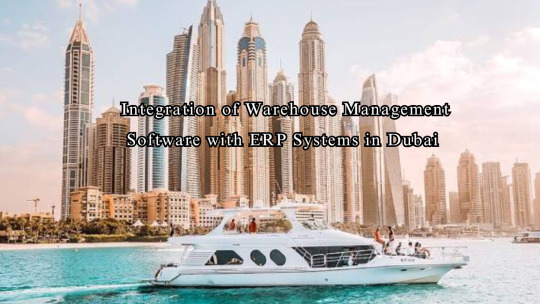
In today's fast-paced and digitally-driven business environment, companies in Dubai are continuously looking for ways to enhance operational efficiency, reduce costs, and improve customer satisfaction. One significant step towards achieving these goals is the integration of Warehouse Management Software (WMS) with Enterprise Resource Planning (ERP) systems.
This integration is not just a trend—it's a necessity for companies seeking seamless business operations, especially in logistics-heavy sectors like retail, manufacturing, distribution, and e-commerce. Let’s explore why this integration matters and how it benefits businesses in Dubai.
Why Integration Matters
Warehouse Management Software handles the day-to-day operations of a warehouse: inventory tracking, receiving, picking, packing, and shipping. ERP systems, on the other hand, manage broader business functions—accounting, sales, procurement, HR, and more. When these systems operate in silos, data inconsistency and communication gaps can occur, leading to delays, errors, and increased costs.
Integrating WMS with ERP allows for real-time data flow between warehouse operations and other departments. This ensures that every part of the business works with up-to-date, accurate information.
Key Benefits of Integration in the Dubai Market
1. Enhanced Inventory Visibility
Dubai’s retail and distribution sectors rely heavily on real-time inventory insights. Integration ensures that stock levels, item locations, and movement data are always synchronized between the warehouse and business management systems.
2. Improved Order Accuracy
With integrated systems, order information flows directly from the sales module of the ERP to the warehouse, reducing the risk of picking and shipping errors. This leads to faster fulfillment and higher customer satisfaction.
3. Streamlined Supply Chain
Dubai serves as a key logistics hub in the Middle East. Integration helps businesses manage complex supply chains more efficiently by providing centralized control over purchasing, warehousing, and distribution.
4. Faster Decision Making
Real-time reporting and analytics across both systems allow management to make data-driven decisions quickly—critical in the highly competitive Dubai market.
5. Regulatory Compliance
With the UAE's strict VAT and import/export regulations, integrated systems help ensure accurate record-keeping and compliance with legal requirements.
Industries in Dubai Benefiting from WMS-ERP Integration
Retail & E-commerce: To handle rapid order processing and same-day delivery demands.
FMCG & Distribution: For accurate stock control and automated replenishment.
Construction & Building Materials: For managing large inventories across multiple warehouses.
Pharmaceuticals: To ensure regulatory compliance and traceability.
Choosing the Right Integration Approach
Businesses in Dubai should work with software providers who offer customizable, scalable integration options. Whether through API-based connections, middleware solutions, or native integrations, the goal is to ensure smooth, uninterrupted data flow.
Some popular ERP platforms used in Dubai (like SAP, Microsoft Dynamics, and Oracle NetSuite) offer plug-and-play integrations with advanced WMS systems, reducing the need for custom development.
Conclusion
The integration of Warehouse Management Software Dubai with ERP systems is a game-changer for businesses in Dubai. It aligns warehouse operations with broader business goals, drives efficiency, and enhances customer service. As Dubai continues to grow as a global trade and commerce hub, investing in integrated digital solutions is no longer optional—it's essential for long-term success.
0 notes
Text
Seamless Sync: Integrating ERP Solutions with Your Shopify Store for Smarter Operations
Running a growing Shopify store can be exciting, but with success comes complexity. Managing inventory, orders, customer data, accounting, and shipping — all while ensuring smooth customer experiences — can become overwhelming. That’s where ERP (Enterprise Resource Planning) solutions come in. Integrating an ERP system with your Shopify store isn’t just about automation; it’s about creating a smarter, more streamlined business that scales with ease.
Why ERP and Shopify Go Hand in Hand
Shopify is an excellent platform for e-commerce. It’s user-friendly, flexible, and packed with tools to help you sell online. But as your business grows, you’ll find that managing everything manually or using disconnected tools creates data silos and inefficiencies. That’s where ERP integration makes a huge difference.
ERP software centralizes all your core business functions — from finance and HR to inventory and customer relationship management. When integrated with Shopify, it allows real-time data flow between your store and backend operations. The result? Fewer errors, better inventory control, faster order processing, and more time to focus on growth.
The Benefits of Seamless ERP Integration
Here’s what you stand to gain when you sync your ERP system with Shopify:
Inventory Accuracy: No more overselling or underselling. Real-time stock updates across all sales channels mean your customers always know what’s available.
Order Automation: Orders from Shopify can be automatically pushed to your ERP system for processing, billing, and fulfillment, cutting down manual entry and human error.
Improved Customer Experience: With accurate data and faster shipping, customers get their products on time, and you maintain a positive brand reputation.
Data-Driven Decisions: Centralized analytics from both Shopify and your ERP give you a clearer picture of your business performance.
Scalability: As your business grows, your ERP system grows with it. You can easily add new features, teams, and sales channels without worrying about data chaos.
Choosing the Right ERP for Shopify
Not all ERP systems are the same. When choosing one, look for software that offers native integration with Shopify or has connectors that enable smooth data exchange. Popular options include NetSuite, SAP Business One, Microsoft Dynamics, and Odoo. Consider your budget, industry needs, and the size of your operation when evaluating these tools.
Ready to Streamline Your Shopify Operations?
If you're still juggling spreadsheets and struggling with order errors, it's time to level up. Integrating ERP with your Shopify store isn’t a luxury — it’s a necessity for growing brands that want to thrive in a competitive market.
Let our team of Shopify integration experts help you find and implement the right ERP solution for your business. Contact us today to schedule a free consultation.
Conclusion
Running an online store doesn’t have to mean endless admin work. With the right ERP system synced to your Shopify store, you’ll gain operational clarity, improve efficiency, and deliver a better experience to your customers. Don’t let backend chaos limit your growth — take the smart route with seamless ERP integration and watch your business run like never before.
0 notes
Text
How Kerala’s Logistics Training Prepares You for Global Jobs
The logistics industry has become one of the fastest-growing sectors globally, creating a massive demand for skilled professionals. Kerala, known for its high literacy rate and strong educational infrastructure, is steadily emerging as a key hub for logistics education in India. With numerous well-established logistics institutes in Kerala, students now have access to globally relevant training that prepares them for opportunities not just in India, but across international borders.
The Global Demand for Logistics Professionals
From shipping and warehousing to supply chain management and freight forwarding, logistics is the backbone of global trade. With the rise of e-commerce, cross-border shipping, and automation, the industry is now highly dynamic and in constant need of qualified professionals. Countries in the Middle East, Europe, Singapore, and North America are particularly active in recruiting talent from India — and Kerala is contributing significantly to that talent pool.
Why Choose a Logistics Institute in Kerala?
Kerala offers a unique blend of quality education, industry exposure, and affordability. Here are a few reasons why logistics institutes in Kerala are standing out:
1. Comprehensive Course Curriculums
Most institutes offer diploma, advanced diploma, and PG diploma programs in logistics, supply chain management, shipping, and freight forwarding. These programs are designed with international standards in mind, often incorporating modules on global logistics practices, international trade laws, Incoterms, and customs documentation.
2. Experienced Faculty & Industry Experts
Many logistics colleges in Kerala have faculty with real-world experience in shipping, supply chain management, port operations, and international trade. Guest lectures from industry veterans and alumni working abroad provide students with insights into global market demands.
3. Practical Training with Simulations
Unlike traditional classroom settings, Kerala’s logistics institutes focus on hands-on training, including case studies, software simulations (like ERP and SAP), warehouse management systems, and port visit internships. This practical exposure is vital for global readiness.
4. Strong Placement Support
Institutes like TransGlobe Academy, Cochin Shipyard Maritime Institute, and Naipunnya Institute of Management offer robust placement support with tie-ups to international shipping companies and logistics firms in the UAE, Qatar, and Singapore.
Core Skills That Make Kerala Students Globally Competitive
Students graduating from logistics institutes in Kerala are trained in the following areas, which directly align with global job expectations:
Supply Chain Optimization: Techniques used by MNCs to reduce costs and increase delivery efficiency.
International Shipping & Documentation: Including Bill of Lading, Letter of Credit, export-import documentation, and Incoterms.
Customs Clearance Procedures: Both Indian and international systems.
Freight Forwarding & Multimodal Transport: Skills relevant to port cities and global logistics hubs.
Soft Skills & Communication: Many institutes offer English training, personality development, and interview preparation for overseas job markets.
Global Job Opportunities After Studying in Kerala
Graduates from Kerala's logistics institutes can explore the following global roles:
Logistics Coordinator (UAE, Singapore, UK)
Shipping Executive (Dubai, Qatar, Oman)
Supply Chain Analyst (Germany, USA, Netherlands)
Warehouse Supervisor (Australia, Canada)
Freight Forwarder (Hong Kong, South Korea)
Kerala’s geographic proximity to major ports and the Gulf region adds a strategic advantage, especially for those targeting jobs in the Middle East and Southeast Asia.
Popular Logistics Institutes in Kerala
Here are some well-known logistics institutes that are making an impact:
TransGlobe Academy (Kochi & Calicut) Offers globally recognized logistics and aviation programs with international placement support.
Cochin Shipyard Maritime Institute (CSMI) Known for maritime and port logistics training with hands-on experience.
Naipunnya Institute of Management (Cherthala) Offers specialized courses in logistics and supply chain with skill-based training.
Indian Institute of Logistics (Kochi) Provides certifications with international affiliations.
St. Aloysius Institute of Logistics and Management (SALM) A reputed institute for PG diploma in supply chain management.
Final Thoughts
As the logistics industry continues to expand globally, logistics institutes in Kerala are stepping up to meet international standards. With the right blend of theoretical knowledge, practical exposure, and soft skills, students from Kerala are increasingly landing high-paying global roles.
If you're aiming for a career in international logistics, choosing a reputed logistics institute in Kerala could be your gateway to a successful and rewarding career abroad.
0 notes
Text
Warehouse Management System (WMS): The Backbone of Efficient Logistics
Managing a warehouse today isn’t just about stacking boxes and printing shipping labels. It’s about speed, precision, and visibility. That’s where a Warehouse Management System, or WMS, becomes a game-changer for businesses of all sizes.
If you're wondering how a WMS can transform your operations, you're in the right place.
What is a Warehouse Management System?
A Warehouse Management System (WMS) is a software solution that helps control and streamline all warehouse operations—from inventory tracking and order picking to receiving, packing, and shipping. In simple terms, it acts as the brain of your warehouse, ensuring everything runs efficiently and with fewer errors.
Why is WMS Important?
A warehouse without a WMS is like a city without traffic lights—chaotic and unpredictable. A good WMS helps:
Minimize picking and packing errors
Increase inventory visibility
Improve space utilization
Optimize workforce efficiency
Accelerate order fulfillment
These improvements aren’t just for show—they lead to better customer satisfaction, reduced costs, and higher profitability.
Key Features of a WMS
Today’s WMS platforms are built to handle complex workflows while being easy to use. Some core features include:
Real-time inventory updates
Barcode and RFID scanning
Automated replenishment alerts
Zone-based picking and wave picking
Returns and reverse logistics processing
Integrated shipping label generation
These tools give warehouse teams the ability to work faster and with far more accuracy.
Types of Warehouse Management Systems
There isn’t a one-size-fits-all when it comes to WMS. The four most common types include:
Standalone WMS – Installed locally and used exclusively for warehouse functions
Cloud-Based WMS – Hosted on the cloud, accessible from anywhere with internet
ERP-Integrated WMS – Embedded into enterprise software like SAP or Oracle
Supply Chain Execution Suites – Part of a larger supply chain management platform
Each has its strengths. Smaller businesses might favor cloud-based WMS tools, while large corporations may opt for robust ERP-integrated solutions.
How Does WMS Work Inside a Warehouse?
Here’s a simple walkthrough of how a WMS improves everyday operations:
A shipment arrives → WMS records incoming inventory
Goods are scanned and stored → WMS tracks their exact location
An order comes in → WMS tells workers the fastest way to pick it
Order is packed → WMS prints the shipping label and updates inventory
Item is shipped → WMS closes the transaction and logs the update
This seamless workflow drastically reduces manual errors and improves order cycle times.
Is SAP a WMS?
Yes. SAP offers a Warehouse Management module called SAP EWM (Extended Warehouse Management). It's a highly configurable system that supports complex warehouse processes, real-time tracking, and deep integration with SAP’s broader ERP and logistics tools.
What Are the Core Functions of a WMS?
A modern WMS typically handles:
Inventory tracking
Order fulfillment
Goods receiving and put-away
Picking and packing optimization
Labor and task management
Returns and restocking
Reporting and analytics
These functions help businesses stay competitive by creating faster, more accurate warehouse environments.
Benefits of Implementing a WMS
The return on investment for WMS software can be enormous. Here’s what businesses gain:
99%+ inventory accuracy
25–50% faster order processing
Reduced labor costs
Improved customer satisfaction
Greater warehouse transparency
Whether you manage one small storage facility or multiple distribution centers, a WMS can be scaled to fit your business model.
FAQs About WMS
🔹 What are the 4 types of WMS? Standalone, Cloud-Based, ERP-Integrated, and Supply Chain Execution Suites.
🔹 What is WMS in a warehouse? It’s the system that manages and automates key warehouse tasks—inventory, picking, packing, and shipping.
🔹 Is SAP a WMS system? Yes, SAP offers a warehouse solution called SAP EWM, designed for complex logistics operations.
🔹 What are the functions of WMS? Core functions include real-time inventory tracking, order fulfillment, returns processing, labor management, and analytics.
Final Thoughts
A Warehouse Management System is no longer a “nice-to-have”—it’s a “must-have” for businesses looking to scale efficiently and deliver consistently. In a world where customers expect next-day delivery and perfect accuracy, a robust WMS ensures your warehouse meets those expectations with ease.
If your business is growing and you’re still tracking inventory on spreadsheets, it might be time to level up with a smart WMS. It’s not just about keeping up—it’s about staying ahead.
#Warehouse Management System (WMS)#ERP-integrated solutions#Extended Warehouse Management#supply chain#supply chain management platform#ERP and logistics#SAP EWM#WMS
0 notes
Text
ERP Software Company in Kochi

Introduction
Kochi, the commercial capital of Kerala, is witnessing a surge in digital transformation across industries such as shipping, IT, tourism, manufacturing, and retail. One of the primary technologies accelerating this change is Enterprise Resource Planning (ERP). This blog explores the growing demand and offerings of ERP software companies in Kochi, the advantages they bring to various sectors, and how businesses can leverage SEO-optimized ERP development services for visibility and growth.
What is ERP Software?
ERP is a centralized business management solution that integrates various core functions—such as finance, human resources, inventory, production, and customer relationship management—into one seamless platform.
Core ERP Modules:
Financial Accounting
Inventory and Warehouse Management
Human Resource Management
Customer Relationship Management (CRM)
Manufacturing and Production Planning
Procurement and Supply Chain Management
Project Management
Business Intelligence & Reporting
Importance of ERP Software in Kochi's Business Landscape
1. Shipping and Logistics
ERP helps in managing fleet operations, cargo tracking, freight billing, and port logistics with real-time data accuracy.
2. Tourism and Hospitality
Enhances booking systems, inventory, guest experiences, HR, and payroll management in resorts and hotels.
3. Manufacturing Units
Supports production scheduling, raw material procurement, quality control, and equipment maintenance.
4. Retail and E-commerce
Provides centralized stock management, real-time sales analytics, and POS system integrations.
5. Healthcare Institutions
Streamlines patient record systems, billing, compliance, and hospital inventory management.
Benefits of ERP Software for Kochi-Based Enterprises
Enhanced Productivity
Centralized Information Access
Improved Financial Control
Efficient Resource Allocation
Regulatory Compliance and Reporting
Custom Dashboard and KPIs Monitoring
Remote and Mobile Access with Cloud ERP
Multi-language and Multi-currency Support
Top ERP Software Companies in Kochi
1. Infopark Solutions Pvt. Ltd.
Specialized in scalable ERP systems for manufacturing and export businesses.
2. KochiSoft ERP Developers
Offers modular and cloud-based ERP with CRM and HR integration.
3. Zerone Technologies
Known for robust and secure ERP software for financial institutions and logistics firms.
4. NavAlt Technologies
Focuses on maritime, marine, and industrial ERP customization.
5. Techno Globe ERP Solutions
Delivers enterprise-grade ERP with IoT, AI, and automation features for large organizations.
Custom ERP Development vs. Ready-Made Software
Feature Custom ERP Ready-Made ERP Personalization Fully customizable Limited customization Cost Higher initial investment Lower upfront cost Integration Seamless with existing tools May require APIs Scalability Highly scalable Depends on vendor Time to Deploy Longer Quicker setup
Technologies Used in ERP Development in Kochi
Languages: Python, Java, PHP, C#
Frameworks: Odoo, SAP, Oracle NetSuite, ASP.NET
Databases: PostgreSQL, MySQL, Oracle, MS SQL
Platforms: AWS, Azure, On-premise Servers
UI/UX: ReactJS, Angular, Bootstrap
Mobile: Flutter, Kotlin, Swift for mobile ERP apps
Industries That Benefit Most from ERP in Kochi
Maritime and Logistics Companies
Coir and Agro-Based Exporters
Rubber and Chemical Manufacturers
Multi-chain Retailers and Wholesalers
Educational Institutes and Universities
Ayurveda and Wellness Centers
Hospitals and Diagnostic Labs
Tourism and Hotel Groups
Future Trends in ERP Development in Kochi
AI-Driven Forecasting and Predictive Analytics
Blockchain in ERP for Transparent Supply Chains
IoT-Integrated Smart Manufacturing ERP
Chatbot Integration and Voice Commands
Augmented Reality (AR) for Real-time Data Visualization
Conclusion
ERP software companies in Kochi are playing a vital role in modernizing business operations, enhancing productivity, and delivering data-driven insights. From SMEs to large-scale industries, ERP adoption is no longer optional but essential. Custom ERP development tailored to local business needs is empowering Kochi-based enterprises to thrive in an increasingly competitive marketplace.
0 notes
Text
Staff IT Software Engineer (SAP ABAP)
Job title: Staff IT Software Engineer (SAP ABAP) Company: Palo Alto Networks Job description: and development of PaloAlto’s next-generation Sales and Distribution, Material Management, Hardware Shipping, Subscription Billing… Specialist (preferred) Additional SAP certifications are a plus Soft Skills * Strong analytical and problem-solving abilities… Expected salary: Location: Bangalore,…
0 notes